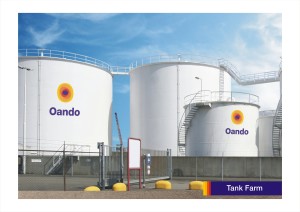Oil
Petrol sells for N110 at oil depots
This, according to market sources, is the reason behind the high prices for which the product is selling at filling stations across the country.
Since the National Association of Road Transport Owners and the Petroleum Tanker Drivers’ arm of the Nigeria Union of Petroleum and Natural Gas Workers called off their strike, which was called to protest the debts owed their members by the petroleum product marketers, nearly all the filling stations have refused to sell petrol at the official pump price of N87 per litre. The product is currently being sold for between N150 and N200 per litre.
The Chairman, NUPENG, Lagos Zone, Alhaji Tokunbo Korodo, confirmed to our correspondent in a telephone interview that loading of products from the depots had been intensive since the strike was called off. This, however, has not led to the normalisation of the price at the depots.
Korodo described the flow of product at the depots as seamless, saying, “For us now, loading is done 24 hours of the day. We are also doing overnight loading to ensure more products get to Nigerians.”
A marketer, who belongs to the Depot and Petroleum Products Marketers Association, who spoke to our correspondent on condition of anonymity, however, said the supply of petrol “is not much currently.”
According to him, tankers are being attended to on a first-come-first-serve basis owing to the excess demand situation, which currently characterises downstream operations.
Commenting on the high prices for which the product is being sold at the depots, the source said, “It will be difficult to regulate the market now because we have an abnormal situation. Fixing the N82 per litre price for petrol at the depots is not feasible now. It will take some time before it will be business as usual.”
Marketers of petroleum products said on Tuesday that the current petrol supply challenge would continue throughout the week.
They also confirmed that loading of petrol had resumed across board with members of the Major Oil Marketers Association of Nigeria and DAPPMA driving the exercise.
But they told our correspondent that because of the May 29 public holiday, the supply hitch was likely to prevail till next week because there would not be product loading on Friday and Saturday.
It was also gathered that Folawiyo, Capital Oil and Nipco were championing overnight loading of petrol at the Apapa depots.
Meanwhile, the leadership tussle rocking the Independent Petroleum Marketers Association of Nigeria has aggravated the scarcity of refined petroleum products across the country, the National President of the body, Mr. Obasi Lawson, has said.
According to him, the association controls over 60 per cent of the retail outlets for refined petroleum products in the country, adding that the crisis had prevented most members of the group from having access to the products.
For about two weeks now, the country has witnessed severe scarcity of petroleum products, a development that has paralysed economic activities across the nation.
Lawson said during a meeting of stakeholders in Abuja on Wednesday that products meant for IPMAN members’ filling stations were diverted to the outlets of the Major Oil Marketers Association of Nigeria and the Depot and Petroleum Marketers Association of Nigeria as a result of the lingering leadership crisis.
He said, “IPMAN is a major player in the downstream subsector of the oil and gas industry. We control over 60 per cent of the retail outlets across the country and we have over 10,000 members with over 30,000 petrol stations. What the masses suffered because of fuel scarcity was largely caused by the crisis in IPMAN.
“Before the crisis started in IPMAN, you will agree that there was no problem of fuel scarcity for about three years into the administration of President Goodluck Jonathan.
“But the suffering started as a result of this crisis and this is because we control 60 per cent of the retail outlets. As a result of the crisis, we are not getting products as and when due; the products that were supposed to come to us were diverted to MOMAN and DAPMAN. And as of that time, most of our petrol stations were not selling.
“It is not that we are not getting the products, but we get them at exorbitant prices and we have to transport them ourselves. It wasn’t the fault of the Pipelines and Products Marketing Company, but it was because we were not united. They prefer giving products to MOMAN and DAPMAN that are united.”
Lawson, however, stated that the crisis had been resolved as a result due to the intervention of the Federal Government.
Oil
NNPC Targets 60% Methane Emission Reduction By 2031
The Nigerian National Petroleum Company Limited (NNPC) has unveiled a bold strategy to reduce methane emissions in the oil and gas sector by 60% by 2031, with an ultimate goal of achieving net-zero emissions by 2060.
This announcement reinforces Nigeria’s leadership role under the Global Methane Pledge initiative and its commitment to tackling climate change.
The Group Chief Executive Officer of NNPC, Mele Kyari, disclosed these plans during a meeting on Thursday with Robert Leahman, the U.S. State Department’s Global Methane Program Manager, and a delegation from Deloitte.
READ MORE: Atiku Gloats Over AUN’s Achievements Ahead Of 20th Anniversary
The discussions, held at the NNPC Towers in Abuja, focused on collaborative efforts to reduce methane emissions through innovative and sustainable practices.
“Reducing methane emissions is not just an environmental necessity but also a strategic imperative for Nigeria’s energy transition. We are leveraging partnerships to adopt global best practices and innovative solutions,” Kyari stated.
Key among these efforts is a pilot project in the Niger Delta, aimed at establishing emissions baselines, mitigating methane leaks, and promoting sustainable operations across Nigeria’s energy sector.
The project, a partnership between NNPC, Deloitte, and the U.S. Bureau of Energy Resources, will utilize data-driven methodologies to pinpoint and address methane hotspots.
Robert Leahman commended Nigeria’s proactive stance, describing it as a benchmark for other nations on the continent.
“Nigeria’s leadership under the Global Methane Pledge sets a standard for the continent. These initiatives will not only help reduce emissions but also drive sustainable development in the energy sector,” he said.
Kyari highlighted the broader benefits of addressing methane emissions, noting its significance for both environmental protection and economic efficiency.
“This collaboration is a game-changer. By addressing methane leaks, we’re reducing waste, saving costs, and protecting the environment. It’s a win-win for our economy and the planet,” he added.
Oil
FG Introduces New Incentives To Revitalize Nigeria’s Oil & Gas Industry
In a strategic move to revitalize Nigeria’s oil and gas sector, the Federal Government has unveiled two key fiscal incentives aimed at attracting investment and enhancing energy security.
The announcement was made by Mr. Wale Edun, the Minister of Finance and Coordinating Minister of the Economy on Wednesday.
The first initiative, the Value Added Tax (VAT) Modification Order 2024, introduces critical exemptions for essential energy products and infrastructure, including Diesel, Feed Gas, Liquefied Petroleum Gas (LPG), Compressed Natural Gas (CNG), Electric Vehicles, Liquefied Natural Gas (LNG) infrastructure, and Clean Cooking Equipment.
Read Also: Atiku Calls For Rotational Presidency Across Nigeria’s Geopolitical Zones
These exemptions are designed to reduce living costs for Nigerians, promote energy security, and accelerate the transition to cleaner energy alternatives.
The second initiative, the Notice of Tax Incentives for Deep Offshore Oil & Gas Production, offers new tax relief options for deep offshore exploration projects.
This measure aims to position Nigeria’s deep offshore basin as a premier destination for international oil and gas investments, boosting the country’s appeal to foreign investors.
These reforms are part of a broader set of policy initiatives, known as Policy Directives 40-42, endorsed by President Bola Ahmed Tinubu.
The directives reflect the administration’s commitment to fostering sustainable development in the energy sector and enhancing Nigeria’s competitive edge in the global oil and gas market.
Business
Tinubu set to approve ExxonMobil-Seplat oil deal, expands CNG bus initiative

By Yemie Adeoye
NIGERIA’s President Bola Tinubu has announced that the protracted ExxonMobil-Seplat upstream oil divestment will be formally approved by the Minister of petroleum within a matter of days, just as he announced his government’s intention to expand the Compress natural Gas, CNG buses initiative.
The President who stated this during his Independence day nationwide broadcast stated that the move is in line with his administration’s commitment to free enterprise, free entry and free exit in investments which is the hallmark of his administration investment policy.
“Fellow compatriots, our administration is committed to free enterprise, free entry, and free exit in investments while maintaining the sanctity and efficacy of our regulatory processes. This principle guides the divestment transactions in our upstream petroleum sector, where we are committed to changing the fortune positively. As such, the ExxonMobil Seplat divestment will receive ministerial approval in a matter of days, having been concluded by the regulator, NUPRC, in line with the Petroleum Industry Act, PIA. This was done in the same manner as other qualified divestments approved in the sector.”
The President also seized the opportunity to plead with Nigerians to be patient with his administration’s reform policies. “As your President, I assure you that we are committed to finding sustainable solutions to alleviate the suffering of our citizens. Once again, I plead for your patience as the reforms we are implementing show positive signs, and we are beginning to see light at the end of the tunnel”.
“Our energy transition programme is on course. We are expanding the adoption of the Presidential Initiative on Compressed Natural Gas for mass transit with private sector players. The Federal Government is ready to assist the thirty-six States and FCT in acquiring CNG buses for cheaper public transportation.
Fellow Nigerians, while we are working to stabilise the economy and secure the country, we also seek to foster national unity and build social harmony and cohesion. Our economy can only thrive when there is peace”. he enthused.




















